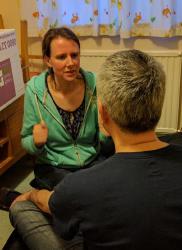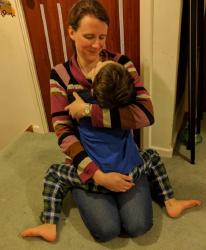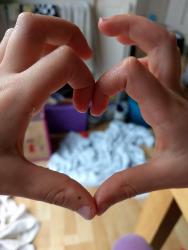What is peaceful parenting - and where do I start?
Peaceful parenting
Peaceful parenting sounds simple from the outside - you just have to parent, without losing your sh*t, right? But you only have to have even just a tiny toe on this path to start to realise that there is SO much more to it than that.
Peaceful parenting is believing in something different from the prevailing cultural ideas about children and why they (children) do the things they do. It’s questioning your own assumptions, exploring your inner experiences, and realising you are only really able to change your own behaviour, not that of others. It’s aligning with the latest psychological, neurological, developmental and trauma research. It’s not trying one strategy a couple of times and thinking that’ll cut it - it’s a constant journey of change, and a whole new way of life for many of us.
What is peaceful parenting NOT?
Two big myths
We have to start with what I feel is one of the two biggest myths about peaceful parenting - and that’s that it’s all about being Zen-like and calm, and that everybody is happy and cooperative All The Time. I can tell you that this is absolutely not the case - so if you’re starting out and thinking you must be getting it wrong because in your family you see lots of big feelings or behaviours like anger, tears, aggression or metaphorically (or literally!) pushing you away, I can absolutely reassure you that you’re not getting anything wrong, and this is completely normal in peaceful parenting families!
And the other HUGE myth about peaceful parenting? That there are no ‘rules’, and everyone just does whatever they want, all the time, without any regard for others. Nothing could be further from the truth. As you’ll see later, peaceful parenting is not an unguided free-for-all, with hands-off parents - far from it. This can be a really tricky area, as we try to balance not being that stern or angry parent who sets lots of arbitrary and unfair limits (something many of us experienced as children, and want to get away from), with finding ways to be together that work for everyone in the family, as we live our day-to-day lives. If this balance doesn’t feel like it’s quite in place yet, you are not alone - and there are things you can do to find a better balance. We’ll come onto more of that a little later too.
Not a magic wand - or a one-size-fits-all
Peaceful parenting is also not a quick fix, or a way to stop your children behaving ‘badly’. I think for many of us (myself included), when we first come to this path, we feel like if we’re just more peaceful, more connected - generally “better” at this parenting thing - our children will be ‘fixed’ and will no longer show the behaviours that trouble us, that they will be cooperative, will be happy… Over time, we realise that actually the big work on this path is all about examining ourselves - our own assumptions, expectations, feelings and reactions - and how we can learn and grow ourselves as we travel this path. Which in turn supports our children hugely. Dealing with our children’s behaviours is actually secondary - and ‘fixing’ them doesn’t even come into it.
It’s also really worth saying that peaceful parenting is not going to be the same for everyone. It doesn’t look the same in each family, different resources and strategies might be used, and it isn’t even always the same for each individual within that family. But at its heart, peaceful parenting has the same root - which is all about connection between parent and child.
Not the easy path!
Before we get into that foundation of connection though, I must dispel one final myth - and that is thinking that peaceful parenting is the easy path to choose. It. Is. NOT!! Even when we’ve only just started out on this path, we quickly come to realise this, but I think many who are not on this path do not, and think we’re swanning along, leaving our kids to get on with it, and everything is ‘perfect’ - nothing could be further from the truth!! Peaceful parenting is, over time, a deep-dive into knowing ourselves, knowing our children, establishing our core beliefs and values, and understanding and working with our own challenges, so that we can be the parent we want to be. Easy it is not!
What is peaceful parenting?
There are many names for what I am here broadly calling ‘peaceful parenting’: gentle parenting, connected parenting, responsive parenting, conscious parenting, intentional parenting, respectful parenting… And I’m sure a few more that haven’t sprung to mind as I write this! You’ll see all of these terms used as you travel this path and do your own research into this area. And although there are arguably some differences between these approaches, they all rest on the same sorts of foundations, which are reflected in their names. But for me, the biggest foundational building block of all, is around developing a strong connection with our children. And if we want to be connected, we will need to (learn to) be respectful, intentional, responsive…
Connected relationships
So building, maintaining, and repairing connection with my children is where I start when I’m thinking about my own parenting. Peaceful parenting is about finding connected, peaceful, respectful, cooperative ways to move through life. I might ask myself in any given moment, ‘Will this action or response build connection, in this moment?’ or ‘How can I connect right now?’ - and this can help to guide me around what I want to do in any given moment.
And there are lots of tools, ideas and strategies out there which can support us in building connection with our children (see below for ideas) - because although it’s natural to want to connect with our children, there are lots of things that can get in the way of that at times. That might be things like our own conditioning (how we were raised, how our culture views parenting), or our current circumstances (lack of time, lack of support, lack of capacity to deal with what’s coming at us in the moment). But as we examine what’s hard, we can slowly take steps towards better understanding what’s going on, and making any necessary changes - and bringing our parenting (and our life) more into alignment with our values and beliefs.
Acceptance, not resignation
Another part of peaceful parenting, is about learning to accept circumstances as they are in the moment. That doesn’t mean getting stuck there, and resigning ourselves to how things are even if they are hard - but it does mean cultivating a kind of rolling-up-our-sleeves, this-is-how-it-is-right-now sort of mentality, when we’re facing the challenges that life throws at us. Because we will face challenges as parents, that’s for sure! And being able to do this - being able to accept exactly what is in the moment - is often what can help us to stay calm, even in the face of really big stuff that our children bring to us. Again, this is NOT easy (no surprise there!) - but we can make changes and see shifts, so that we don’t get so sucked in to what is hard.
And this is one area where the ‘inner work’ comes in. Inner work is all about exploring our own unique experiences, so that we get to know ourselves better and understand our own reactions to life. As we do this, we develop the ability to take action and to live from an increasingly informed, intentional, conscious, present-in-the-moment, accepting place - rather than being hijacked by our subconscious, which tends to make us act in ways that we don’t always understand, and often later regret!
Finding a balance with boundaries
Further up, I talked about finding balance within our families - this is where boundaries come in. We don’t have hard and fast ‘rules’ in our house about what’s ‘allowed’ and what isn’t - we discuss and learn and decide as we go, together as a family. We aim to not damage property, nor to hurt ourselves or each other (with words or anything else!), but that’s a guideline not a “rule” - and we have to help support each other to stay on track with it. What I mean by that, is we don’t make it a hard-and-fast ‘rule’, because it would be unrealistic to expect children (and especially our highly reactive children) to always be able to hold off on impulses without support - and let’s be honest, even as adults we benefit from support to walk away at times!.
In other, more everyday areas, we try to respectfully ask for what we need in a given moment (not always easy as parents!), as well as to reflect on the impact our actions have on others - so a boundary might look like saying, ‘I’m feeling really tired right now, and I don’t think I’m going to manage the mess the paints make - would it be ok to leave that until tomorrow?’. Learning to compromise, and to consider our own needs and desires, as well as those of our children and others, is important!
Finding support

Healthy expression of feelings
Being very human, as all of us are, there are often big feelings that come up in peaceful parenting families - especially (but by no means only!) from our children. So (another!) one of our big learnings as peaceful parents is how to develop the capacity to ‘hold’ these big feelings (create space for them, and allow them to be, just as they are). We are taught in our culture (I’m in the UK, but many cultures are similar in this respect) that big feelings should be dealt with, gotten rid of, as soon as possible - think of all the times children get told that ‘big girls/boys don’t cry’ or all the times distraction is used to stop tears. And never mind anger, which is absolutely not allowed in our culture - being told off for ’talking back’ or being sent to bedrooms and isolated, are common reactions to anger when it comes from children.
In a peaceful parenting approach, we aim to allow all feelings that arise - although we may have to step in (warmly) if the behaviours that occur as a result of those feelings are destructive or hurtful. And we learn strategies to support our children to develop ways to express their big feelings in a healthy way, rather than shutting the feelings down or lashing out. (It’s also worth knowing that when we get started on this path, you might see an increase in big feelings being expressed by our children - this is because we’ve created more connection and safety for them to let the feelings out, so it isn’t a bad thing, even though it can feel hard!!)
We also learn that all behaviours send a message, and if we only deal with what we see on the surface (like shutting down the behaviours, or stopping the tears, and so on), we’re not dealing with the underlying cause of the behaviour. Of course, again, always, a big part of this is doing the inner work to know ourselves and to understand our own reactions to big feelings, so that we can find compassion for what our child is experiencing, but without getting too ‘drawn in’. Another huge piece of work on this path!
A lifetime’s journey
There’s so much more I could say on what peaceful parenting is - I feel like the journey itself is a lifetime one, so there is always so much more to learn and explore and say! Just to finish this section though, I think it can be helpful to hold in mind the guiding principle that people do well when they can (to paraphrase Pam Leo, author and parent educator), and when people feel better, they do better. Connected parenting aims to help people feel what they need to feel, in a supportive, safe relationship, and to move through the feelings and come out the other side. Once we’ve done that, we feel better, and so we tend to act in ways that are more aligned with what I call our ’true selves’ - loving, cooperative, giving, tending to our own needs, connected, and so on. In other words, we do better.
There is just one other thing that I want to briefly touch on here, and that is peaceful parenting as a justice movement. If you follow any peaceful parenting blogs, or accounts on social media, you will see, to a greater or lesser extent, many posts on seemingly unrelated topics like anti-oppression, climate change, and human rights - right alongside all the peaceful parenting information. It’s beyond the scope of this post to go into any depth here, but it’s important to know that a peaceful parenting approach is one of the strands that contributes to making this world a better, more equitable, more just, more sustainable place - and I believe it can’t be divorced from other anti-oppression and social justice work.

It’s also worth noting that peaceful parenting is a privilege. That might sounds strange to hear! But although it’s hard for all of us to break out of the path we were shown as we grew up, it becomes even harder as we add layers of oppression and discrimination onto our lives. So for those of us who, like me, have enough money to put food on the table and keep a roof over our heads, or who don’t have to deal with daily oppressions due to the colour of our skin, or who don’t have to work two jobs and therefore have miniscule amounts of time to do this work, or who have the kind of intelligence that society values and therefore can access some of the more densely-presented information that’s out there around this work, for example, it is easier (not easy, but easiER!), to try to follow this path. If you are managing layer after layer of oppression as well as doing the work to undo your conditioning, those are extra weights to carry, and I believe it’s important to acknowledge and honour that. (If you are managing these extra layers, and need financial support to access my work, we will figure something out.)
What peaceful parenting looks like in our family
As I said above, peaceful parenting looks a little different everywhere you go, but I wanted to give you just a taste of how it manifests in our household - food for thought, but definitely not a to-do list!
In our house, and in no particular order, peaceful parenting can look like:
-
Whole-family discussions about what’s working and what’s not in our family - and how we want to try to change what’s not working.
-
Attempts (and failures!) to find a way that meets everyone’s needs in a particular situation.
-
Revisiting those attempts repeatedly - until we find what works.
-
Learning to handle mistakes with warmth and compassion.
-
Being playful and loving, where culture would have us be cold and punitive.
-
Acknowledging that when we (parents) get frustrated, it’s almost always either that we didn’t put a personal boundary in place soon enough, or it’s a reaction coming from an old hurt we carry. And then working out what to do about it!
-
Getting cross and lashing out (sob!!) - then repairing our connection.
-
Finding ways to express anger (not repressing) that aren’t directed at the kids.
-
Checking in with our beliefs regularly.
-
Riding the waves that family life - and wider life - brings (so, learning how to deal with our own big feelings around the things that life throws at us).
-
Learning to know and understand ourselves better.
-
Learning to look after ourselves.
-
Learning that not being perfect is ok!
Where you can learn more about peaceful parenting
There are many resources out there that can support us on this journey - it can feel quite overwhelming to know where to start! Here are a few of my favourites to get you going - take a look, see what calls you, and leave the rest or come back to it further down your path.
-
Educate yourself. On this path, you will get people who think that parenting should ‘come naturally’ and that we shouldn’t have to look for help or support with it. I’ve written more about why that isn’t the case here, but in short, we DO need to relearn parenting, if we want to do it differently from how we were raised, and from how our local culture expects us to do it. It’s the hardest, most involved job we’ll ever have to do, so ongoing, on-the-job updating of knowledge and skills is a must - just like in any other job we might do!!
-
Start exploring and noting down your own unique core values, beliefs and priorities - these will change over time, and you’ll likely want to revisit these often on your journey, but it helps to have some sort of foundation to rest your thoughts, explorations and learning on. When we know what we truly believe in our heart, it makes it MUCH easier to stay steady when we encounter the naysayers, as well as helping us when we have our own personal wobbles about what it is we’re trying to do. Over time, we learn increasingly to trust our intuition - which is a huge help in staying aligned with our own values when we encounter the inevitable challenges and changes on our parenting path.
-
Find practical peaceful parenting approaches to learn new ideas to support you on this path. Hand in Hand Parenting is a beautiful, neuroscience-aligned approach which encompasses compassion and support for us parents, exactly where we are on our path at any given time, with practical tools to help us navigate the challenges that parenting inevitably throws at us.
-
Books/audiobooks are wonderful sources of inspiration - some of my favourites for getting started are listed here (in book form, because that’s my bag!!):
- Listen - by Patty Wipfler and Tosha Schore
- Raising Humans with Heart - by Sarah MacLaughlin
-
Follow aligned accounts on social media - here are just a few of the many helpful ones!:
-
Get support - this might be through a counsellor or therapist, through a Listening Partnership (one of the Hand in Hand Parenting tools), or through a like-minded community, like our online community group - or a combination of them all! Support is an invaluable resource on the path.
-
Explore some journalling or self-exploration prompts to help you clarify where you’re at and what you need to move forwards - finding ways to stay intentional and to dig into our own inner work is essential on our journey. Here are some ideas for you to explore:
- What do I do already that builds connection with my child?
- Are there areas where I notice our connection isn’t as strong as I would like? (Hint, that is the case for all of us, and there is no shame in that!)
- How did my parent/carer/s connect with me as a child?
- How would I have liked them to connect with me?
- How can I keep moving forwards on this peaceful parenting path?
- What small step(s) will I take next?
-
Keep learning and growing! Join our community newsletter to say in the loop with this amazing, challenging work!

Emilie Leeks
AuthorEmilie is a heart-centred life mentor and space holder, supporting those on a healing path. This is not an easy journey, and often we can find ourselves losing our way. Emilie's work meets you where you're at, with beautiful, accepting support and connection, and weaves that support with practices and explorations in self-compassion, body connection, and a return to a deep trust in ourselves. Note: all blog post content which refers to them, has been read and agreed to by Emilie's children.
View All Posts